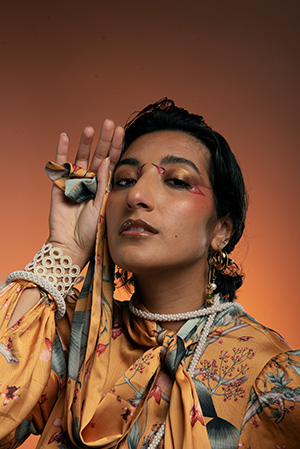What the Poem Wants: Cassandra Myers interviews Rob Macaisa Colgate

Past poetry contributor Cassandra Myers talks with Rob Macaisa Colgate, whose poem “On Sex” appears in our fall issue #228. They discuss museums, languaging sex, and how disabled folks are often forced to be representatives of their entire community.
Rob Macaisa Colgate (he/she/they) is a disabled bakla poet and playwright. A 2024 Ruth Lilly and Dorothy Sargent Rosenberg Fellow, he is the author of the poetry collection Hardly Creatures (Tin House, 2025), the verse drama My Love is Water (Ugly Duckling Presse, 2025), and Feeble, winner of the 2024 Poetry Online Chapbook Series. His work appears in Best New Poets, American Poetry Review, Poetry Daily, and Poets.org, among others, and has received support from MacDowell, Fulbright, Lambda Literary, Sewanee, and Kenyon Review. He serves as a reader for POETRY Magazine and managing poetry editor at Foglifter. The inaugural poet-in-residence at Tangled Art + Disability, he received an MFA in poetry and critical disability studies from the New Writers Project at UT Austin.
What are your instincts around languaging sex? When do you choose to metaphorize sex, shroud, allude to details versus stating point blank narrative yet with purpose? How often do you make one choice over the other? What impact does it have on you, and as a by-product, your audience to disclose your experiences of sex both joyous and sticky?
I suppose it depends. I find myself thinking less of definition and more of language itself as a material. My choices surrounding the figurative depend more on what the poem needs on a language level than what I am personally comfortable with. Some poems need the directness of “sex,” the familiarity of “love,” the grandiosity of “contortions.” I care more about what the poem wants than what I do.
Tell me more about the vantage point of the two speakers, this call and response, Q+A formatting of the poem where the leading speaker seems to be looking off into the distance but picking off details with precision and the respondent seems to be filing its nails, almost bored with the response, as if the question’s answer is so obvious to everyone but the interviewer. Is there a temporal change in the speakers, talking to each other through the void of different moments in time?
This poem came together as an attempt to have a speaker answer different questions about their particular experience of disabled sex. I had simply accumulated a lot of those questions over time. People make a lot of assumptions about how disability must impact sex. They also ask a lot of weird, rude questions. I thought a poem would make them prettier. The responder’s brevity was less about a sassy attitude and more about not complicating the exchange.
The three-line refrain “Museum” as a closer to the couplets feels like a burial. Filing away the conflict between sex and status and safety in the same place vials are cluttering the basements of labs. Is the archive of memory in the hallways of “i guess i must” acceptance a defeat? A dissociation? Or does the poem / poet serve as curator / curation and thus agentic amongst a platter of less-than-ideal choices?
Really, I thought about how museums exist to be witnessed. And, similarly, how disabled folks are often forced to be representatives of our entire community, unfairly witnessed so that able-bodied folks can attempt to learn from us, even about personal things like sex. When that happens, it can feel like something was stolen from you and placed in a display case without full permission.
Or, perhaps more truthfully, I had simply been trying to fit more museums in my poems. I like the word itself. And Hardly Creatures (Tin House, 2025), the collection that houses this poem, takes the form of an accessible art gallery. It just made sense.
As someone who's entire first poetry collection revolves around the stickiness of “safe” sex, I am curious to know what is your ultimate dream for the sexiest, consensual environment you can imagine? What elements of the space, the time, the mood, the shape, would have to align to give your yes it's most resonant sonic?
My boyfriend, poppers, our bedroom in our Chicago apartment. We recently purchased a Casper mattress. It’s fabulous.
Personally, uniting my body and my mind to play nice in sex as someone with chronic pain, survivor history, and vulvodynia ends up as a somatic spectrum of experience between catastrophe and celebration. Sometimes I think about my hypersensitivity because of my cripness as a synesthesia of sorts, a seventh sense, with partners telling me it's a super power. Does your disability also force you to / invite you to unfold notions of sex, desire, touch, within your somatic microbiome you never thought were possible? Maybe you wish they weren't possible. Maybe, like me, you also wish sex could be simple, easy, glossy, safe.
I think my disability affects the conditions surrounding sex more than the sex itself. Boys are lowkey not that interested in sleeping with psychos. And it doesn’t help that I have a grating personality.
I take pretty heavy antipsychotics that make me sooo sleepy. I have lots of memories of going home drunk with a stranger after the club and having to coyly figure out if I was being invited to sleep over and, if so, when to sneak my meds. I would keep them in that little capsule that comes with the Kinder egg prize. If I miss the meds at night, they’re too sedative to take in the morning, but the half-life is so short that psychosis catches up to me quickly. So I have to get out of that apartment fast.
When I’m in psychosis, I don’t really think about sex, and I’m not sure that I miss it in those moments. Sometimes after a psychotic episode I jerk off to try to feel better and it feels like my dick is made of clay.
I've been studying the “ambient poetics” of crip-eco-poetics, which “reflects the significance of multimedia in general, and synesthesia in particular” (Morton, 2007). Your poem feels undoubtedly synesthetic—the plastic perfume of lube, the clop of a chunky heel on concrete, third day hickies stumbling purple. Ocean Vuong writes that metaphor is the autobiography of sight, signalling to me that metaphor longs for our visual senses more than our other sensora. Do you agree that metaphor is the autobiography of sight, holding the “DNA of seeing,” and thus does not require context when strongly enacted? If not, which sense takes the lead in your poems most often, and which other sense does it overlap with most in its autobiography?
Huh. Well, I’m very into image, which I suppose privileges sight. But I also think of image as simply the product of effective description. And, more than senses, I am led by clarity in my writing. Whatever sensory description adds up to the clearest image, that is what I pursue. That said, I don’t think this is one of my clearest poems. I’m a fraud, I guess.

Cassandra Myers









